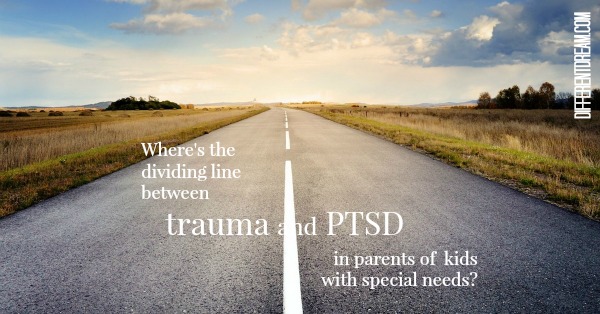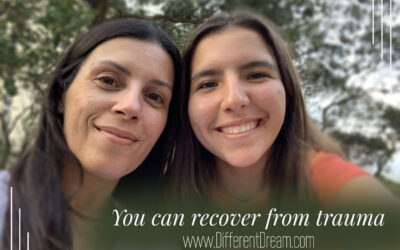The Dividing Line Between Trauma and PTSD, Pt. 2

This post is the second in a new series about special needs parenting stress, trauma, and PTSD. The first post introduced the series, and child psychologist Liz Matheis briefly explained how the stress experienced by parents of kids with PTSD and other special needs can result secondary PTSD. Today, Dr. Matheis is back to answer this question sent by a Different Dream reader who is the mom of a son with autism: Where is the dividing line between trauma and PTSD? Here is her reply:
On a daily basis, we experience stress. Stress is that feeling of “Oh my gosh, I’m going to be late!” or “I’m never going to get this done on time!” We all know that feeling in varying degrees. On some days, a car accident or our child breaking a bone takes that daily stress to a new high. But overall, we cope, perhaps with a glass of wine, a bubble bath, or an early bedtime. The next day, we get up and do it again. By then, we are no longer reminiscing about yesterday’s stressors–unless you are continuing to handle the stress of yesterday–and you are able to focus on the next major task or event of your life, positive or negative. That is your good old experience of stress. You feel overwhelmed in the moment, you are done with it, and you move on.
So, when does good, old stress become Post Traumatic Stress Disorder (PTSD)? PTSD is related to a traumatic event (such as a shooting, abuse) either directly or through indirect experience (such as social workers who work with children who are sexually or physically abused). The experience of stress or thoughts about it remain relatively constant, taking very little break if any at all. This kind of stress impacts a person’s ability to make decisions, focus, and complete daily tasks. The individual suffering from PTSD can be agitated, hypervigilant, or even angry. Their stress also impacts appetite (stress eating or no/low appetite), sleep, interpersonal relationships, and ability to manage daily tasks like grocery shopping or managing bills.
The deciding factor of when stress has become chronic and pervasive is when you it impacts overall functioning. It’s that line between, “This really stinks, but I’ll get through it,” and “I can’t breathe, I’m not going to make it, and I don’t want to do this anymore.”
Parents of children with special needs who have been traumatized by their journey in gaining a diagnosis, seeking treatment, participating in treatment, and managing daily behaviors and struggles can develop PTSD. When parents feels stuck, hopeless, helpless, and burned out their stress has developed into PTSD, and it’s time to seek help through a psychologist, support group, or psychiatrist.
Your Questions about the Dividing Line Between Trauma and PTSD
Does Liz’s information bring to mind new questions about special needs parenting stress, trauma, or PTSD? If so, you’re invited to leave them in the comment box.
Do you like what you see at DifferentDream.com? You can receive more great content by subscribing to the quarterly Different Dream newsletter and signing up for the daily RSS feed delivered to your email inbox. You can sign up for the first in the pop up box and the second at the bottom of this page.

By Liz Matheis
Dr. Liz Matheis is a clinical psychologist and school psychologist in Parsippany, NJ. She offers support, assessments, and advocacy for children who are managing Autism Spectrum Disorders, ADHD, learning disabilities, and behavioral difficulties, as well as their families. She is also a contributor to several popular magazines. Visit www.psychedconsult.com for more information.
2 Comments
Submit a Comment
Subscribe for Updates from Jolene
Related Posts
Trauma vs. Trust
For special needs parents, figuring out trauma vs. trust becomes the difference between enduring life and enjoying it.
Flying Near the Sun as a Special Needs Parent
Guest blogger Lisa Pelissier explains how she copes when she is flying near the sun as a special needs parent.
How Can I Make You Feel Safe?
Whether your loved one suffers from trauma or dementia, the best question a caregiver can ask is, “How can I make you feel safe?”






Hi Samantha, you ask a good question, and in my opinion, the answer is yes. PTSD in parents of kids with special needs is very common. It is sometimes called secondary trauma or compassion fatigue. You can read more about it in this very popular Different Dream post: http://differentdream.com/2015/02/stress-ptsd-and-parents-of-kids-with-special-needs/. You can also type “PTSD” or “trauma” in the Different Dream search box to get to a series on the topic written by parents of kids with special needs. Jolene
Is it possible to have partial ptsd related to special needs?
My sons disease was caused by a virus during pregnancy, the one time you feel like you have absolute control over a childs protection. Since his diagnosis amd the information thereafter, finding out friends and family are expecting terrifies me.